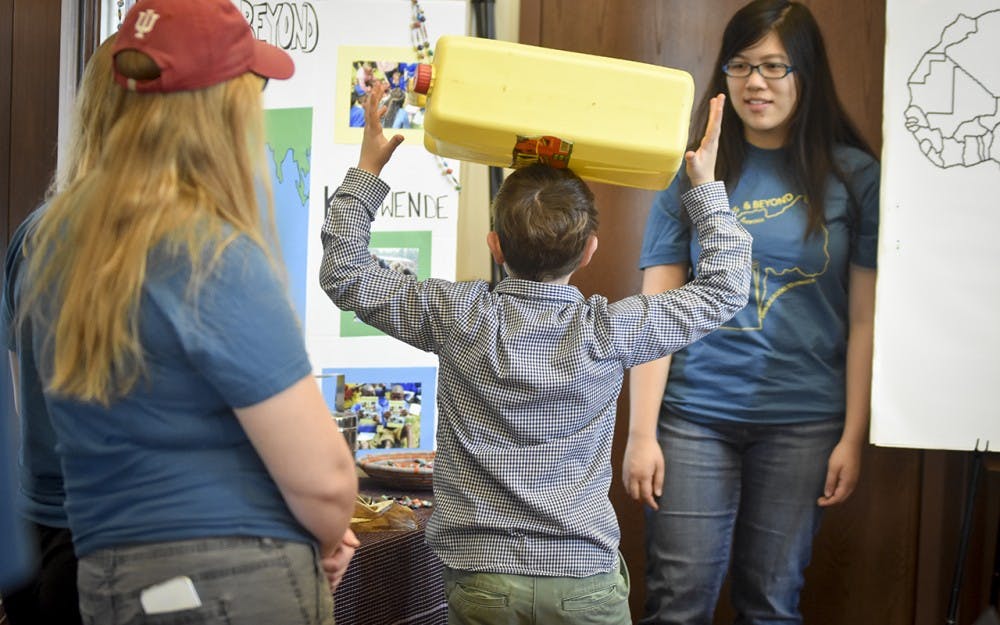Illustrations of gorillas and volcanoes were displayed throughout the Hutton Honors College’s Great Room to celebrate the culture of Rwanda. The illustrations were drawn by children at the Project School in Bloomington after their lessons on Rwandan culture.
Handmade Rwandan items, elementary students’ illustrations of Rwanda, photos of Rwanda and Rwandan food were all available at Visions of Rwanda at the Hutton Honors College Tuesday evening.
All of the event’s proceeds went toward the current initiatives of Books & Beyond, which include opening a library and a playground for children in Rwanda.
Visions of Rwanda is a yearly event put on by Books & Beyond, an IU nonprofit organization that collaborates with local elementary school students and students in Rwanda to encourage engagement in reading and writing.
The program works with students to publish a yearly anthology, “The World is our Home.” This year, the program published its ninth edition.
The program also raises money to benefit Rwandan students by bringing books during a book deficit.
Sophomore Zoie Hancock, who is studying English literature and Korean language, is a member of the organization. She helps to edit both the English and Rwandan stories for the yearly anthology.
“Since Books & Beyond is a nonprofit organization, fundraising is a big source of where we get our income,” she said. “For example, this summer, we’re planning on building a playground for the students in Rwanda. Obviously that becomes a very costly project.”
Cyanne Loyle, professor of political science, addressed some of the issues facing Rwanda today, 23 years after the Rwandan genocide, which was a mass murder of about 800,000 of Rwanda’s Tutsi people that took place through the course of 100 days.
Loyle is an East African specialist whose work focuses on the justice process of countries in the area before and after armed conflicts, such as the Rwandan genocide.
In 2004, she visited Rwanda to help build a documentation center, a museum-like memorial which is now home to items that belonged to people who were murdered in the genocide.
“I was raised up from the hope from this community,” she said.
However, five years later Loyle visited the country again to examine issues of justice within gacaca court, community courts put into place to work through the aftermath of the Rwandan genocide.
Loyle said the hearings are public, which allows for local villagers to stand up and testify for or against a perpetrator.
“This is a way of bringing justice to a much more local level,” she said. “It’s also a way of being able to address what was a large person backlog. It was hundreds of thousands of people that were in prison.”
Loyle said the courts are run by older members of villages because Rwandan officials couldn’t handle the large number of perpetrators who were accused of crimes during the Rwandan genocide, and the courts are overseen by government officials.
The number of perpetrators who were tried was so high because it included people who had not just committed a violent crime, Loyle said.
The primary issue that raised concern was whether the courts violate due process. However, people who support the courts say it was the only way to handle the mass number of individuals accused of crimes during the genocide, Loyle said.
Loyle said she would like to regain the hope she had for Rwanda’s future in 2004.
“With projects like this, we can continue to learn and work toward peace and a more stable and just future for all people,” she said.
Two of the authors were at the event to read the stories they wrote for the anthology.
One student wrote “The Adventures of Emma and Maya,” a story about an elephant named Maya, who is lost before she runs into a hornbill named Emma, who helps her find her home. A second student read his story about homeless orphans, one of whom felt lucky to be adopted.






